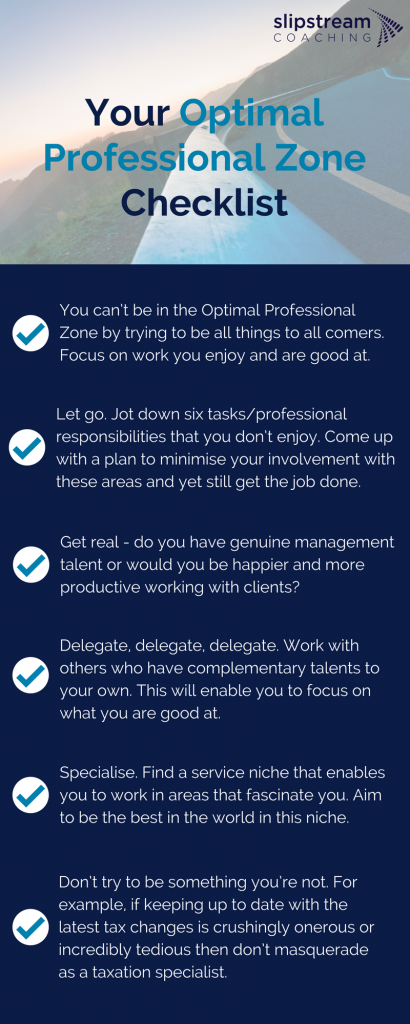In this article from Slipstream’s Scott Charlton, Scott takes you to some places you’re trying to avoid in helping you to learn what it’s going to take to have more great days at the office.
The most value that gets added to a professional services firm is when the owner is “In the Zone.” What a shame so little time is invested there.
For the vast majority of professionals in practice, their most enjoyable periods at work include “doing their thing” in face-to-face client meetings, engaging in that first interaction with a new client, completing a major assignment or reaching a project milestone, mentoring younger team members and collaborating with other professionals.
Most practitioners agree that these are also the areas where they are adding the most value. They further agree that if the majority of their time was involved in these activities, they would be far happier – and make more money.
Because time invested with clients and prospects on high-level issues is usually the “Optimal Professional Zone,” it raises some interesting questions. If this is where professionals are best suited, what are the obstacles that get in the way? In particular, what can you do to have more great days at the office?
Why so little time is spent in the Optimal Professional Zone
Obstacles and Distractions
Some of the immediate obstacles that come to mind preventing professionals from being in their Optimal Professional Zone include dealing with client queries and doing low-level work, attending to issues relating to management, finance and team members, marketing and sales, and finally, organisational deficiency in which too many hats are worn because there’s no one else who is available to do the task.
Many of these have the potential to accumulate, and once you have these responsibilities or distractions, it is very difficult to shed them. Distractions can be the worst enemy of a professional. It’s not always easy to get into the headspace required to work through a complex problem. The concentration needed to deeply consider a client’s situation and develop potential solutions is a delicate flower, easily crushed by interruptions.
On top of this, most professionals are their own worst enemies in terms of their willingness to assist others, be accessible, and do “their fair share.” Consequently they can be seen photocopying, filing, binding reports, chasing up debtors, and even emptying the dishwasher in the office kitchen.
Let’s Talk Management
Very few professionals enjoy management-related activities. Those with talent for management invariably migrate to such roles. For the majority, however, management responsibilities occur by default – because they are the owner, the most senior person and/or there is no one else on the team deemed capable.
The seriousness of this situation goes much further than simply not having an enjoyable day. By losing focus on what they do best professionals run the risk of severely compromising the success of their firms and the potential benefits their clients could receive. These other responsibilities bob up at inopportune times, are the cause of stress, and otherwise consume headspace best directed elsewhere.
Towards better work habits
There are three important categories of work habits that need to be considered and how these have a significant effect on the daily work of professionals: diary management, setting priorities and personal organisation. Very few professionals have had any training in these categories and invariably they lack the awareness and discipline required to achieve optimum results.
Lack of Diary Management
It’s all too easy to be a slave to your work diary. Invariably appointments are scattered throughout the working week and sometimes beyond business hours. These appointments often feature a high degree of perceived urgency, with the result that professionals utilise their energies keeping up with a torrent of interaction. Unfortunately, this compromises less deadline-oriented issues, including time out for holidays, professional development, attending significant family events, developing goals and strategy, business development, and improving processes.
Failure to Set Priorities
Without a clear sense of what’s important, professionals react to what is immediately in front of them. Consider a typical day at the office that starts with contemplating various files and documents left on the desk from the previous day. These get pushed to one side whilst the overnight emails are attended to and the first of the day’s management hassles must be dealt with. One or two client phone calls later and it’s lunchtime. This process continues until the close of business, at which time some more serious client work gets undertaken, before rushing home to see the kids before they go to bed.
Professionals need a strong sense of what they should be doing and what they should let go. This means delegating tasks best performed by others, declining opportunities that are outside core objectives, and encouraging subordinates to come up with solutions and recommendations rather than just bringing problems to be fixed. In fact, the most powerful question in successful management is, “What’s your recommendation?”
Personal Disorganisation
Lack of effective work habits certainly contribute to a professional being distracted – making appointments, responding to emails, filing, booking travel and accommodation, interruptions, accommodating the priorities of others. To overcome this, professionals must train and develop their team members to take on new tasks, encounter fresh challenges and build their skills so that you can spend more time with clients, developing your skills and having time away from the office. Simply put, your razor’s edge can’t be maintained if it’s continually being blunted by work better delegated to others.
Having more great days at the office
There is absolutely no reason why you should continue to toil away in areas you are not enjoying and adding little value. It’s time to take charge and explore the activities that you should be almost exclusively involved in.
Here’s a simple self-test – “How best to structure my working week to have great days at the office all the time?” Alternatively, it may not yet be clear. If you are unsure about what it is that you like doing, approach it from the other direction, progressively peeling back the layers to reach a more satisfying centre. Start by identifying those tasks which aren’t core activities. What should be delegated, reassigned or otherwise divested? Typically these will be non-client related.
Whether you find this analysis straightforward or challenging, your imperative is to maximise time in your Optimal Professional Zone. Putting this simply you are going to be happier, add more value and make more money the longer you are there. It is your responsibility to implement the changes required to become more professionally fulfilled. Making such changes may be scary at first but ultimately it’s essential for you to enjoy professional life.

Scott Charlton is a Chartered Accountant and a director of Slipstream Coaching, a company dedicated to assisting financial practitioners achieve their potential. A long-term business coach to both accountants and financial planners, Scott is also the author of three books regarding professionals in practice. Scott can be contacted by phone 0409 870 330 or via email scott@slipstreamcoaching.com.au











